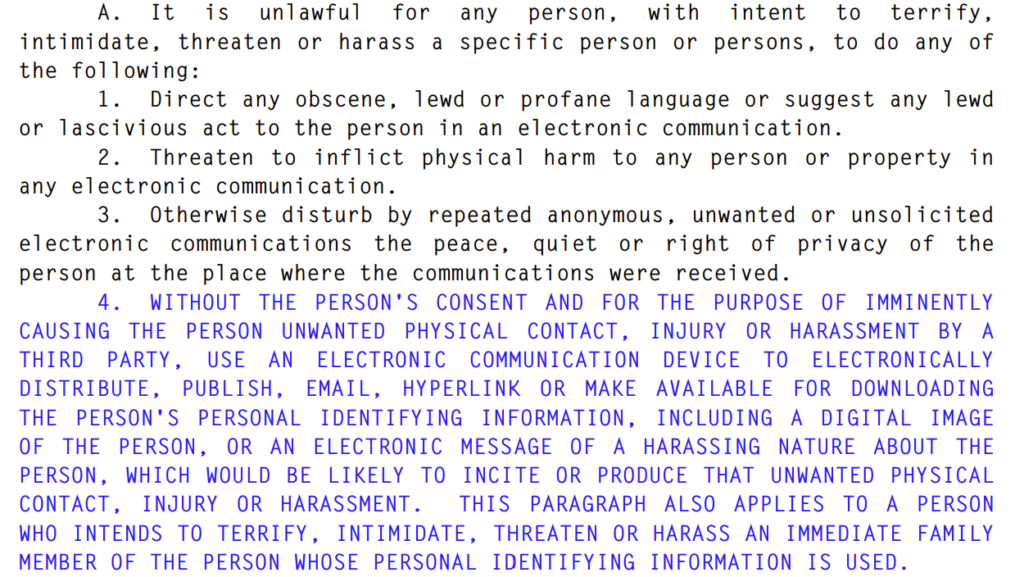Is Doxxing Illegal In Arizona?
Laura Martisiute
Reading time: 4 minutes

Table of Contents
If you live in Arizona and are interested in online privacy and keeping your personal information safe, you’ve probably asked yourself: Is doxxing illegal in Arizona?
In this guide, we’ll review the criminal consequences of doxxing in Arizona and examine how the state defines doxxing.
Is Doxxing Illegal in Arizona?
Yes. The act of doxxing is illegal in Arizona as the state recognizes the risks that can come from someone sharing your personal information online without your consent.
The behavior is specifically referred to in Arizona Revised Statutes. § 13-2916(A)(4).

In Arizona, doxxing is defined as using an electronic communication device to electronically distribute someone’s personal identifying information to harass, injure, or cause a person unwanted physical contact.
What is personal identifying information?
Under Arizona’s doxxing law, personal identifiable information is considered to be any information that would make it possible for a person to be contacted, harassed, or located or any information which includes the victim’s home/work address, email address, phone number, or other contact information.

If someone publishes your personal information (especially your contact information) online and it leads to “unwanted physical contact, injury or harassment,” they can be charged with doxxing under Arizona’s doxxing law.
When Is Doxxing Not a Crime In Arizona?
It’s not always a crime to dox someone in Arizona. If you’re reporting a crime or engaging in constitutionally protected speech, you won’t be facing charges.
Arizona’s doxxing law also doesn’t apply to an “interactive computer service” (i.e., social media websites like Facebook can’t be charged for doxxing incidents carried out by a third party on their platforms) or information or telecommunications services.
What’s the Penalty for Doxxing In Arizona?
The penalty for doxxing in Arizona is a class 1 misdemeanor, which comes with up to six months in jail and/or a fine of up to $2,500.
Is Doxxing Illegal at the Federal Level?
There is no federal law against doxxing in the United States, which leaves millions of Americans vulnerable to having their personal information published and exploited online.
While Arizona (among other states, including California and Illinois) offers after-the-fact legal protection to its residents, it does not prevent doxxing from happening in the first place.
Whether you live in a place with doxxing laws or not, it’s important to recognize that you can take steps to prevent doxxing. To proactively limit the potential that you’ll be doxxed, you should make yourself undoxxable.
How to Protect Yourself Against Doxxing In Arizona (And Elsewhere)
To make yourself undoxxable, you’ll first need to dox yourself. This may seem counterintuitive, but it is the best approach to finding where your data is visible online and figuring out what steps you’ll need to take to remove or hide it from the general public.
Doxxing yourself is surprisingly easy – take a look at our guide on how to dox yourself, following each recommendation for the best effect. You can also use our list of doxxing tools.
Whatever information you find about yourself online, your next step should be to reduce it. In most cases, that means:
- Opting out of data brokers. Data brokers are companies that collect information about people, compile this information into profiles, and publish them for sale on their sites . You’ll need to opt out of each data broker that has a profile on you. Because brokers relist your data even after you opt-out, you’ll likely need to do it more than once (unless you hire a data broker removal service such as DeleteMe to do it for you continuously).
- Changing your social media security settings from public to private. Depending on the platform you’re using, the process and the results will vary. The goal is to make your biographical details and posts visible to your friends and hidden from the general public.
- Creating and using unique usernames and passwords to prevent bad actors from following your online trail.
- Stopping yourself from giving out unnecessary information online, whether to other people or while setting up accounts or profiles.
The less information there is about you on the internet, the harder it will be for someone to doxx you. For more information, read our guide on how to prevent doxxing.
Our privacy advisors:
- Continuously find and remove your sensitive data online
- Stop companies from selling your data – all year long
- Have removed 35M+ records
of personal data from the web
Save 10% on any individual and
family privacy plan
with code: BLOG10
news?
Don’t have the time?
DeleteMe is our premium privacy service that removes you from more than 750 data brokers like Whitepages, Spokeo, BeenVerified, plus many more.
Save 10% on DeleteMe when you use the code BLOG10.
















